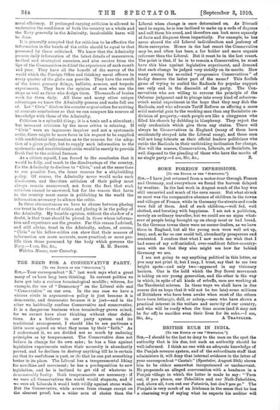THE NEED FOR A CONSERVATIVE PARTY.
[TO THE EDITOR OF THE "SPECTATOR."]
SIR,—Your correspondent "X." last week says what a great many of us have long been thinking. In current politics we have got into a curious terminological muddle ; witness, for example, the use of " Democracy " on the Liberal side and " Conservative " on our own. In the one ease we have a vicious circle in argument—a policy is just because it is democratic, and democratic because it is just—and in the other we habitually confuse Conservative and conservative. It is a dangerous business when terminology grows mixed, for we cannot have clear thinking without clear defini- tions. As a believer in our party system and its traditional arrangement, I should like to see partisans a little more agreed on what they mean by their "faith." As I understand it, we are divided not so much by enduring principles as by temperament. The Conservative does not believe in change for its own sake ; he has a bias against legislative experiments unless their necessity is abundantly proved, and he declines to destroy anything till he is certain (a) that its usefulness is past, or (b) that he can put something better in its place. The Liberal has a temperamental liking for novelties and movement; he has a predisposition to new legislation, and he is inclined to get rid of whatever is demonstrably faulty. Both temperaments are necessary : if we were all Conservatives the world would stagnate, and if we were all Liberals it would butt wildly against stone walls. But the Conservative, while averse from change except on the clearest proof, has a wider area of choice than the Liberal when change is once determined on. As Disraeli used to argue, he is less inclined to make up a code of dogmas and call them his creed, and therefore can look more squarely at facts and diagnose them impartially. For example, he has never shared the old Liberal individualism and jealousy of State enterprise. Hence in the last resort the Conservative may be, and often has been, a far bolder and more organic reformer than the Liberal. But it must be in the last resort. The point is that, if he is to remain a Conservative, he must have this bias against legislative experiment, and demand that each change be judged very strictly on its merits. How many among the so-called "progressive Conservatives" of to-day deserve the latter part of the name? This foolish game of trying to outbid the Radicals for popular support can only .end in the discredit of the party. The Con- servatives who are willing to reverse the principle of the Osborne judgment and to plunge into every kind of schwarnt, erisch social experiment in the hope that they may dish the Radicals, and who advocate Tariff Reform as offering a more solid material gain to the working man than any Socialistic re- division of property,—such people are like a clergyman who filled his church by dabbling in blasphemy. They reject the only credentials which give them any status. There will always be Conservatives in England (many of them have accidentally strayed into the Liberal camp), and these men will not long tolerate as their official leaders politicians who outdo the Radicals in their unthinking inclination for change. Nor will the masses, Conservatives, Liberals, or Socialists, be well disposed to the pleading of those who have the merits of
no single par ty.—I am, Sir, &c., Z.










































 Previous page
Previous page